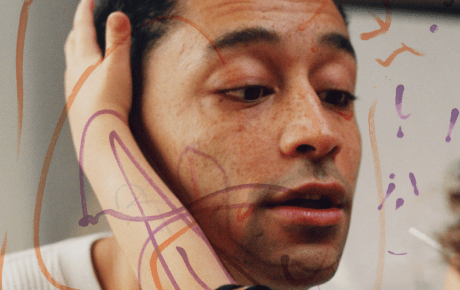TW: This article mentions drug abuse, suicidal thoughts, and depression
Halfway through Juice WRLD’s second posthumous album Fighting Demons, we’re hit with an interlude called ‘Juice WRLD Speaks.’ A snippet of a 2019 interview, the rapper seems torn between his vulnerability and his existence, touching on his mental health and the messages he found important in his music. “I make music talking about certain subjects, because I know that I’m not the only one that’s going through, you know, what’s happening,” he stated. “Me talking about certain things could help somebody else through what they’re going through, as well as me tryna figure it out myself.”
It’s that very concept that perhaps sums up Juice WRLD’s legacy the most. Despite only occupying the space physically for a year and a half, the impact the then 21-year-old had on the masses was phenomenal. An emo-rap patron to the youth, Juice proved he understood the woes of adolescence right from the start. His debut 2018 hit ‘Lucid Dreams’, in its simplest terms, talked about a b***h who broke his heart, and you could really feel the pain jumping off the catchy trap beat. Life as a young person can straight up just suck sometimes, and Juice never once shied away from such subject matter, instead opting to go as personal and deep as he could and prevent his legions of fans from making the same mistakes.
Aptly named, Fighting Demons paints a haunting picture of one of our greatest modern talents almost predicting his own untimely death. A selection from a massive pool of unreleased Juice tracks, the album plays like both a warning and a goodbye, and it’s in some of the rapper’s most honest lyrics that we begin to understand the demons he in fact was battling. Here are 5 of the biggest things we learned from Juice’s latest posthumous project.
1. Mental Health Awareness
One of the biggest reasons why Juice was so popular among Gen Z was his relatability. An advocate for sharing exactly how you’re feeling, the rapper poured every one of his emotions onto the table. Unlike others in the rap game who peeled back the curtain, Juice’s curtain was never closed to begin with, making him a messiah to those who were also struggling. Throughout Fighting Demons, references to Juice’s own battles with his mental health pop up frequently. He admitted defeat in ‘Rockstar in His Prime’, “I can’t deal with this hurt on my own, I cannot deal with this hurt”, and got pensive with loneliness on ‘Feel Alone’, “I wonder if anybody notices when I get in my head and feel alone. No, I don’t think nobody really notices.”
2. Genre-Bending
A key to Juice’s musical identity was his talent for blending different genres and sounds together to create something new. Birthed from the emo-trap SoundCloud movement, which saw a dozen other rappers try to create that rugged trip-hop sound, Juice stood significantly apart from the rest and became a pioneer for a whole new musical rise. Mixing his melancholic raps with often up-tempo beats, he allowed himself to expand his audience. You could listen to him both at the club and alone in your bedroom on a lonely night. On Fighting Demons we hear experimentation with psychedelic pop, 808s, percussion, and a dip into K-pop with the SUGA of BTS collab ‘Girl of My Dreams.’
3. Substance Abuse Awareness
While a victim to his own poison, Juice aimed to share both sides of the coin of substance abuse, detailing both the incredible highs and the incredible lows. Often dealing with his mental health and drug use in the same breath, it eventually became harder and harder to draw the line between the two. Peppered throughout the album are references to Juice’s struggles, and his inability to draw said line, but the true hitter comes in the form of another interlude, this time with Eminem discussing his past substance abuse problem and a time he almost overdosed. “I would say to anybody that it does get better, you know? It just does.”
4. Peace with Death
There’s no denying the overhanging eerie feeling of Fighting Demons. Not because it’s a posthumous album, which typically hold some heaviness to them, but because of Juice’s comfort with death. Throughout his career the rapper has discussed topics of suicide and overdosing, but this record sees him at his most vulnerable. Like a butterfly breaking out of its chrysalis knowing its planned lifespan isn’t long, Juice appears to have provided his fans with a sense of peace regarding his untimely death. “They say living’s harder than dyin’, I’m willing to gamble that,” goes the line on the heart-wrenching ‘My Life in A Nutshell.’ “You still hear my songs on the stereo, you still hear my name on the radio. So I’ll live forever.”
5. Message of Hope
Curated by Juice’s estate and team of close friends, Fighting Demons aims to send the message to teens that it’s okay to get help. From the two carefully placed interludes from Eminem and Juice himself to the selection of slightly haunted tracks, the entire record has been designed to say something vital. Rather than emulate the same behaviours, fans are encouraged to learn from Juice’s mistakes; where others in the rap game glorify drug abuse, the way Juice touched on the subject reeks of melancholy. “You know, that’s not how it should be”, ends ‘Juice WRLD Speaks’. “But that’s how it is and that needs to change, and hopefully I’m one of those people that could bring that change. Or at least start a chain-reaction for somebody else to come and do it after me.”
Juice WRLD’s second posthumous album ‘Fighting Demons’ is available to stream now.
Liked this article? Sign up to our UMUSIC newsletter to hear more from us!












